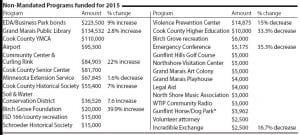Cook County Commissioners held a second work session in what is likely to be a series of meetings to develop a policy on how to fairly distribute funds to local organizations that provide services to the community. After brief public comments before its April 7 work session began, commissioners quickly got down to business, setting parameters on how to proceed.
As he did at the April 2 public meeting, Commissioner Garry Gamble reviewed some of the county’s financial data related to non-mandated services. He stated that county contributions to non-mandated programs had risen 58 percent from 2005 to 2014.
Commissioner Gamble said in 2005, support of non-mandated programs made up 13.5 percent of the county’s levy. In 2014, the percentage had grown to 17.4 percent.
“Each year, when we look at the budget, we have to look at all of these variables,” said Gamble. “Because we deal with a levy that is variable, our decision should be one that is informed, and not emotional.”
How big should the funding pie be?
Gamble said the county board needs to standardize its application process for entities seeking funding from the county. Commissioner Frank Moe said the county needs to make sure not to make the process “overly cumbersome.”
And, Commissioner Moe asked, “Do we want to first make delineation of the criteria—or decide how much it is that the county can give?”
Commissioner Jan Sivertson said deciding how much the county has to give is one way to start the process, but suggested, “If all of the requests are valid and worthy, we may want to look at increasing the levy.”
Commissioner Gamble referred to a statement made by the Lloyd K. Johnson Foundation to its grant recipients explaining that not all requests would be funded.
Sivertson said, “So you’re looking at it like a pie, and making all the pieces smaller, if need be. But could we instead make the pie bigger?”
Commissioner Heidi Doo-Kirk said, “We’re cutting our county services now.”
Commissioners agreed that is one of the first questions that must be answered.
Support comes in many forms
Other questions were raised, such as should there be different categories of non-mandated services? “For example,” said Gamble. “If we have a memorandum of understanding or a contract with an entity or organization—we have to honor that.”
There is a contract between the county and the city for operations of the library, said Gamble. And, he noted, if grant funds had been accepted based on county funding, the county has to honor that commitment.
Commissioner Moe agreed, noting that the county owns the YMCA building and the historical society museum. “So if we own the building should it make a difference?” asked Moe. “If we are maintaining the building, are we already indirectly supporting it?”
Commissioner Doo-Kirk said the county also needs a policy on how to deal with emergency funding requests. Should there be some sort of contingency fund?
What criteria?
Gamble distributed some sample applications for funding from the granting organizations, noting that they are tailored toward specific programs, for example, the arts. He said the county’s funding criteria would have to be broader.
Gamble suggested that funding requests be looked at through an evaluation of: public value, performance and pecuniary (financial stewardship)—the three “Ps.”
The board agreed this was a good start, but Moe asked how it would be put into use. “We’re not going to be able to do this blind. This isn’t a chili cook off,” he quipped.
Gamble replied, “I could develop a matrix, with a 1-5 rating on each component. The aggregate gives you a score.”
Again, his colleagues agreed that his suggestions were a good foundation and agreed to some “homework.” Board members will review the sample applications and criteria developed by Gamble and bring their own ideas to the next meeting for more discussion. Commissioner Moe said board members also need to look at county finances and think about whether the funding levels for non-mandated services should be static or flexible.
The board will hold another work session on non-mandated services at 1 p.m. on April 28 in the commissioner’s room.



Loading Comments